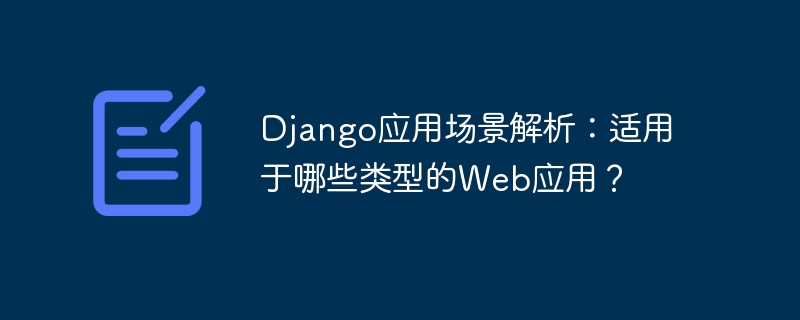

Django is a popular open source web framework written in Python language that can be used to quickly develop high-quality web applications. It is designed to be fast, efficient, and secure, and therefore, Django is widely used in various types of web applications. This article will introduce Django application scenarios and applicable web application types in detail, and provide corresponding code examples.
What types of web applications is Django suitable for?
1. Social network application
Django can implement social network applications very well because it has a powerful user authentication system, rich data model and rapid development capabilities. Social networking applications may need to implement features such as user profiles, friend lists, messaging, and chat rooms. These features can be built quickly using Django, and they can be easily extended.
The following is a sample code for a Django application that implements social network functions:
from django.db import models from django.contrib.auth.models import User class Profile(models.Model): user = models.OneToOneField(User, on_delete=models.CASCADE) bio = models.TextField(max_length=500) avatar = models.ImageField(upload_to='avatars/') class Friend(models.Model): user = models.ForeignKey(User, on_delete=models.CASCADE, related_name='user_friends') friend = models.ForeignKey(User, on_delete=models.CASCADE, related_name='friend_friends') class Message(models.Model): sender = models.ForeignKey(User, on_delete=models.CASCADE, related_name='sent_messages') receiver = models.ForeignKey(User, on_delete=models.CASCADE, related_name='received_messages') text = models.TextField(max_length=1000)
2. Content Management System (CMS)
Django can be used to implement various types of Content management systems (CMS) such as blogs, news and article publishing systems. Using Django, developers can easily create custom content types, manage content, and track content publishing.
The following is a sample code for a Django application that implements blog functionality:
from django.db import models from django.contrib.auth.models import User class Category(models.Model): name = models.CharField(max_length=100) class Post(models.Model): title = models.CharField(max_length=100) content = models.TextField() created_date = models.DateTimeField(auto_now_add=True) author = models.ForeignKey(User, on_delete=models.CASCADE) category = models.ForeignKey(Category, on_delete=models.CASCADE, null=True) class Comment(models.Model): post = models.ForeignKey(Post, on_delete=models.CASCADE, related_name='comments') author = models.ForeignKey(User, on_delete=models.CASCADE, null=True) content = models.TextField() created_date = models.DateTimeField(auto_now_add=True)
3. E-commerce application
Django can be used to develop e-commerce applications, such as online stores and online payment system. Using Django, developers can implement features such as shopping carts, order processing, and secure payments.
The following is a sample code for a Django application that implements online store functionality:
from django.db import models class Category(models.Model): name = models.CharField(max_length=100) class Product(models.Model): name = models.CharField(max_length=100) price = models.DecimalField(max_digits=10, decimal_places=2) description = models.TextField() category = models.ForeignKey(Category, on_delete=models.CASCADE, null=True) image = models.ImageField(upload_to='products/') class Order(models.Model): user = models.ForeignKey(User, on_delete=models.CASCADE) products = models.ManyToManyField(Product, through='OrderItem') created_date = models.DateTimeField(auto_now_add=True) paid = models.BooleanField(default=False) class OrderItem(models.Model): order = models.ForeignKey(Order, on_delete=models.CASCADE, related_name='items') product = models.ForeignKey(Product, on_delete=models.CASCADE) quantity = models.PositiveIntegerField(default=1) price = models.DecimalField(max_digits=10, decimal_places=2)
4. Data analysis and visualization applications
Django can be used to develop various data analysis and visualization applications such as data dashboards and business analysis reports. Data can be easily visualized and presented using Django and other data analysis tools.
The following is a sample code for a Django application that implements data visualization functions:
from django.db import models from django.contrib.auth.models import User class Dataset(models.Model): name = models.CharField(max_length=100) description = models.TextField() class Visualizations(models.Model): name = models.CharField(max_length=100) dataset = models.ForeignKey(Dataset, on_delete=models.CASCADE) author = models.ForeignKey(User, on_delete=models.CASCADE) chart_type = models.CharField(max_length=100) created_date = models.DateTimeField(auto_now_add=True) class Data(models.Model): data = models.TextField() visualization = models.ForeignKey(Visualizations, on_delete=models.CASCADE)
Summary
Django is a powerful web framework that can be used for many types of web app. This article gives four common types of Web applications, such as social network applications, content management systems (CMS), e-commerce applications, and data analysis and visualization applications, and provides corresponding code examples. Using Django, developers can quickly create high-quality web applications.
The above is the detailed content of Django application scenario analysis: What types of web applications is it suitable for?. For more information, please follow other related articles on the PHP Chinese website!
 How to make the background transparent in ps
How to make the background transparent in ps fil coin price today
fil coin price today Representation method of string constant
Representation method of string constant Introduction to java core technology content
Introduction to java core technology content How to solve too many logins
How to solve too many logins How to write html text box code
How to write html text box code Why does my phone keep restarting?
Why does my phone keep restarting? How much is Dimensity 9000 equivalent to Snapdragon?
How much is Dimensity 9000 equivalent to Snapdragon?



